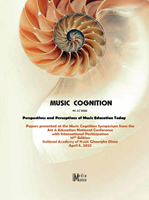Arrigo Boito’s Prologue In Theatre (Mefistofele, 1868) – A Shift In Cultural Perspectives –
Arrigo Boito’s Prologue In Theatre (Mefistofele, 1868) – A Shift In Cultural Perspectives –
Author(s): Alexandru SuciuSubject(s): Theatre, Dance, Performing Arts, Music, Sociology of Art, History of Art
Published by: MediaMusica
Keywords: Opera; Boito; audience; libretto; avant-garde; initiation;
Summary/Abstract: People tend to look at the educational process as a well-outlined set of manifestations within a given context involving teachers and students. However, throughout the history of music there are several composers who have viewed their craft as educational not by organizing seminars, or teaching in schools, but by trying to influence the way the audience relates to their art directly through their works. A perfect example is the Italian composer Arrigo Boito. His work’s libretto was published two months before the premiere, thus allowing the future audience to get acquainted to the subject. It contains a Prologue in the Theatre, which was designed to be read, and not to be staged. In this part, he made the reasons for choosing Faust as the subject clear and gave an account of what it meant to him, all the while maintaining an educational aspect to it. Mefistofele was highly controversial at the time of its premiere (1868). Considering the Italian operatic world had lost its way along the road, Boito tried to abruptly change its course. At the time, the recipe for a successful opera consisted of an emotion-stirring subject, set to a captivating, energetical musical score. Boito chose to alienate his work from this pattern and made his opera unique by using the Faustian myth as a base subject (a philosophical quest, rather than emotional), wrote his own libretto, employed unusual compositional concepts, directed, and conducted the whole show. Knowing what the probable reaction to his new composition would be, he hoped it would reach that part of the audience that would be able to understand his conceptual endeavors, and then gradually be accepted by the other parts of the public, all the while remaining unmoved by his rather rough critics.
Journal: Cogniție Muzicală
- Issue Year: I/2022
- Issue No: 1
- Page Range: 80-86
- Page Count: 7
- Language: English

